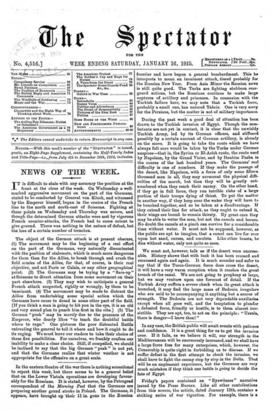During the past week a good deal of attention has
been drawn to the Turkish invasion of Egypt. Though the com- batants are not yet in contact, it is clear that the unwieldy Turkish Army, led by its German officers, and stiffened possibly by a certain amount of German artillery, is already on the move. It is going to take the route which we have always felt sure would be taken by the Turks under German auspices—that is, the Syrian or El-Arish route, the route used by Napoleon, by the Grand Vizier, and by Ibrahim Pasha in the course of the last hundred years. The Germans' real difficulty is one of numbers. If they make the passage of the desert, like Napoleon, with a force of only some fifteen thousand men in all, they may surmount the physical diffi- culties of the march, but then they will be greatly out- numbered when they reach their enemy. On the other hand, if they go in full force, they run terrible risks of a large portion of their troops dying of thirst. To put the matter in another way, if they keep near the water they will have to be bunched together, and so be taken at a disadvantage. If they extend their line for attack, as they ought to extend it, their wings are bound to remain thirsty. By great care they may be able to water the men, but not the camels and horses. No doubt the camels at a pinch can survive for a considerable time without water. It must not be supposed, however, as the publics are apt to imagine, that a camel can live for ever upon hot sand, curses, and amulets. Like other beasts, he dies without water, only not quite so soon.


































